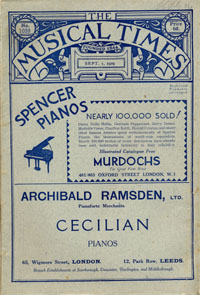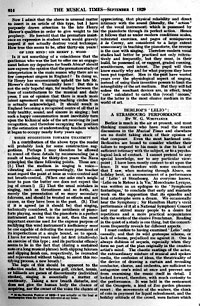
Berlioz’s ‘Lelio’: A Strasbourg Performance
by
W. G. Whittaker
© 1929-2011 W. G. Whittaker
Published in


|
Berlioz’s ‘Lelio’: A Strasbourg Performanceby W. G. Whittaker © 1929-2011 W. G. Whittaker Published in |
 |
Berlioz is much in the air at present, and most thinking musicians who have read the recent discussions in the Musical Times and elsewhere are no doubt taking stock of their opinion of that composer. Even the most hardened anti-Berliozites are bound to consider whether their failure to respond to his music is due to lack of sufficient intimacy with the subject, or to a psychological lack of contact. I cannot pretend to any special knowledge, nor to any particular viewpoint; I have been mostly content to sit upon the fence. It was therefore with some excitement that I saw, when motoring through Alsace, on holiday bent, an announcement of a performance of ‘Lelio’ at Strasbourg. As everyone knows, ‘Lelio ou le Retour à la Vie,’ Monodrame Lyrique, was written as an epilogue to the ‘Symphonie fantastique,’ to conclude that early and masterly work on the supposition that its episodes and final catastrophe were a dream. We occasionally hear the Symphony; Sir Hamilton Harty’s vivid performance of it at a National Symphony Concert last year stirred many people to a desire for repetitions and a more practical acquaintance with the works of the elusive Frenchman. Reading in the quiet of a study is one thing, but the concert-room frequently reveals far different aspects.
I must confess to having examined ‘Lelio’ only casually, and that its wild grotesque scheme, or lack of scheme, prejudiced me against it. One is always dubious of sequels, especially when they form no part of the plan originally in the creative artist’s mind. The chaotic rantings of the actor, the extraordinary mixture of musical and spoken media, the confusion of ideas, the theatricality of the device of drawing a curtain and revealing conductor, chorus, and orchestra, are sufficient to antagonise one’s mind at once and prevent one from examining the music itself in detail. I looked forward, therefore, with much curiosity to the performance. It was held in the restaurant of the Orangerie, a kind of Zoo garden pleasure resort; the movements of the waiters, the chink of coin in payment for liquid refreshment, and the holiday attitude of the crowd, were factors which would somewhat disturb the stolid Britisher’s attitude towards serious music. The forces were the Municipal Orchestra, under the direction of M. E. G. Munch, and the local Chœur de St. Guillaume.
It was a disappointment to find that the work was not given in its entirety, but represented by only four extracts. The opening number was the ‘Chanson de Brigands,’ for baritone solo, male chorus, and orchestra. No one can take brigands in the Byronic vein of Berlioz; the average Englishman is willing enough to laugh at them in musical comedy or enjoy them in a mild way in opera, but to regard them as other than a collection of vagabonds and ruffians and in the light shone by the romantic Hector is not his wont. Apart from that, however, the number proved attractive. One leading theme, a drop of a fourth on strings and wind, answered immediately a semitone lower by brass, has an innate savagery about it which removes the music far from the conventional stage chorus. The ‘Chœur d’Ombres,’ for mixed choir and orchestra, proved more than interesting. The colour effects, as one might imagine, were entrancing, even though they were partially ruined by the inability of the chorus to keep in tune. With ‘La Harpe Eolienne’ (for orchestra only) we came to the real Berlioz; it revealed much charm.
The chief number was the ‘Fantasie sur la Tempête, de Shakespeare,’ an odd insertion into the oddest scheme ever conceived by musician. Most students are familiar with it only through the extract in Berlioz’s treatise on orchestration, where he quotes his treatment of the pianoforte (with two performers) as an experiment in scoring. Though effective enough, the pianoforte was soon lost in the mass of sound, and there was a little sense of disappointment when one recalled the brilliant modern usage of Stravinsky and de Falla. The plan of the ‘Fantasie’ is curious. It begins with a choral and orchestral invocation to Miranda in Italian, the ‘Chœur d’Esprits de l’Air,’ and merges into a lengthy, almost purely orchestral, series of movements, beginning with upper strings (the famous counterpart of the ‘Vorspiel’ to ‘Lohengrin’ in the use of four solo violins), flutes, clarinets, and pianoforte duet (mostly in the higher registers). Afterwards the string basses, ’cellos, and violas enter, and lead to the dénouement for full orchestra. The choir only has short phrases addressed to Miranda and Caliban. The scheme as a whole is unsatisfactory. The use of the choir is too incidental; the final climax calls for united forces. But there is much fascinating music, to say nothing of delightful scoring. Every now and then, when one feels that the harmonic basis is becoming threadbare, there occurs one of those abrupt, almost uncouth, modulations which arrest interest and create a sense of great power. Altogether one felt that this music had been unduly neglected, and one wondered why British choral societies have not exploited it and added to their rather limited Berlioz repertory. It is true that few conductors could dare to produce the entire ‘Lelio’ as the composer planned it, but that is no reason why the best numbers should be relegated to obscurity. If I remember rightly, Breitkopf issues the work with English words. Perhaps this firm might be induced to publish the better parts separately. The work needs a good orchestra, as interest lies chiefly in that direction. It would be an interesting programme to give the Symphony, with these extracts, which take half an hour to perform, as a sequel.
The concert ended with Brahms’s ‘Gipsy Songs,’ arranged by the conductor for vocal quartet, choir, and orchestra. Here the chorus showed its mettle much more satisfactorily, and sang in German. The venture in three languages was not so surprising as it would have been in an English city, for Strasbourg is bilingual; it is not uncommon in the shops to be wished, ‘Guten Abend, Monsieur.’
![]()
* We have transcribed the text of this article from
the 1 September 1929 issue of The Musical Times, a copy of which is in our collection. We have not been able to contact the descendants of the late W. G. Whittaker.![]()
![]()
The Hector Berlioz Website was created by Monir Tayeb and Michel Austin on 18 July 1997; this page created on 11 December 2011.
© Monir Tayeb and Michel Austin. All rights of reproduction reserved.
![]() Back to Original Contributions page
Back to Original Contributions page
![]() Back to Home Page
Back to Home Page
![]() Retour à la page Contributions Originales
Retour à la page Contributions Originales
![]() Retour à la Page d’accueil
Retour à la Page d’accueil